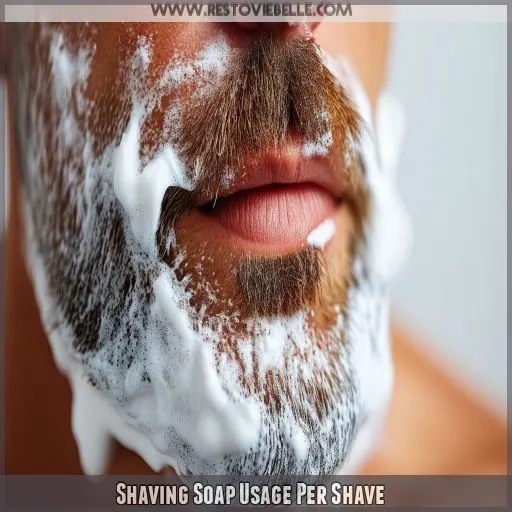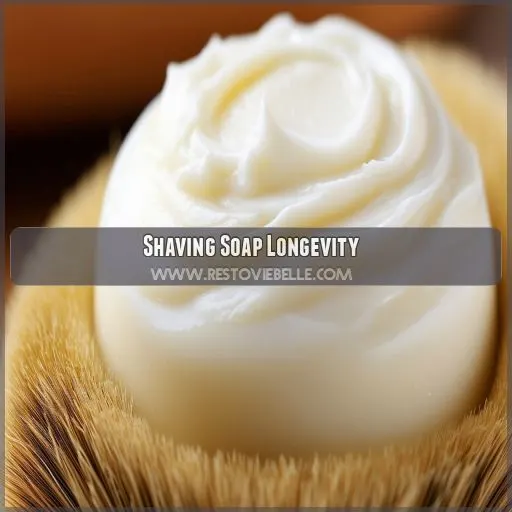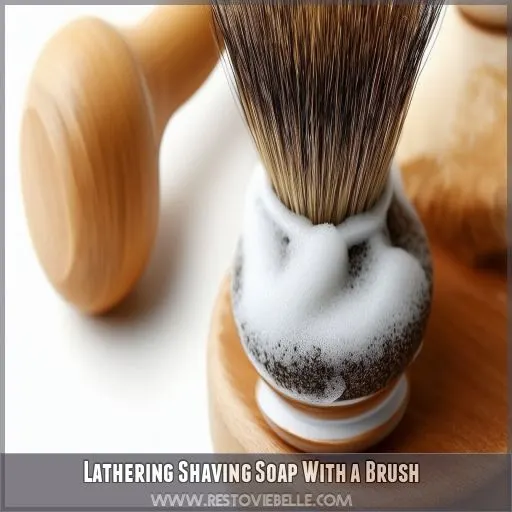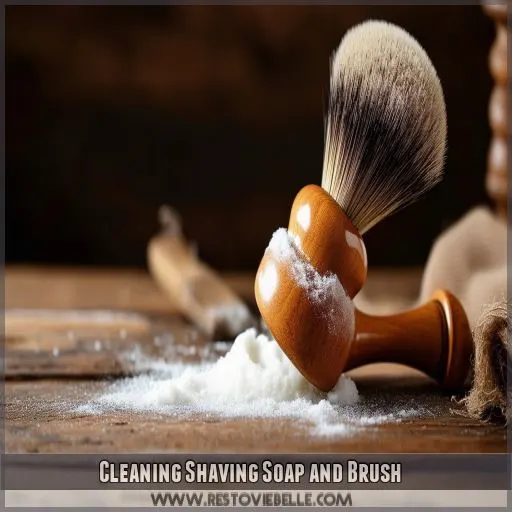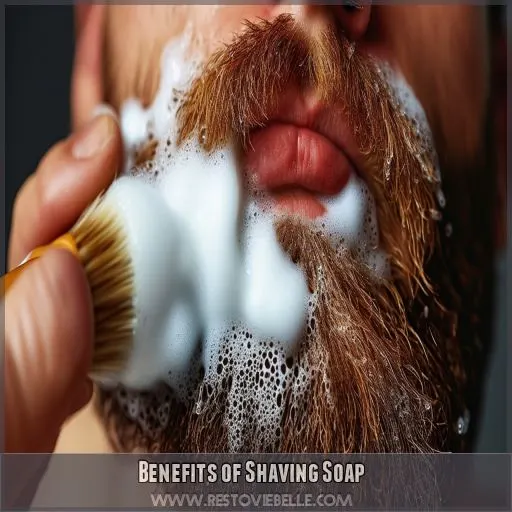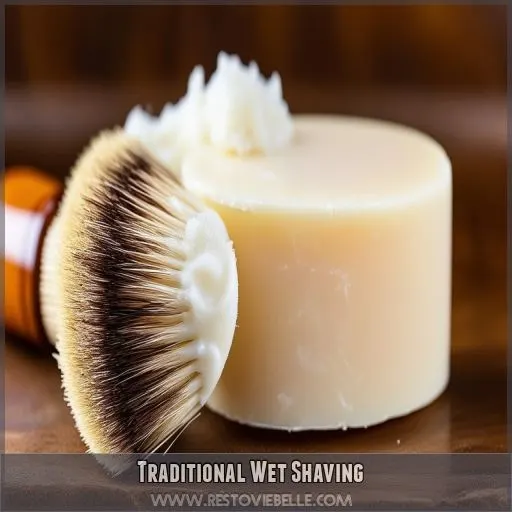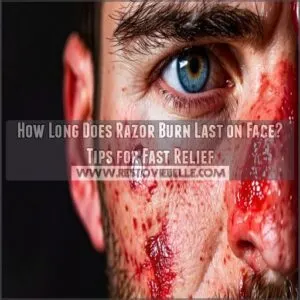This site is supported by our readers. We may earn a commission, at no cost to you, if you purchase through links.
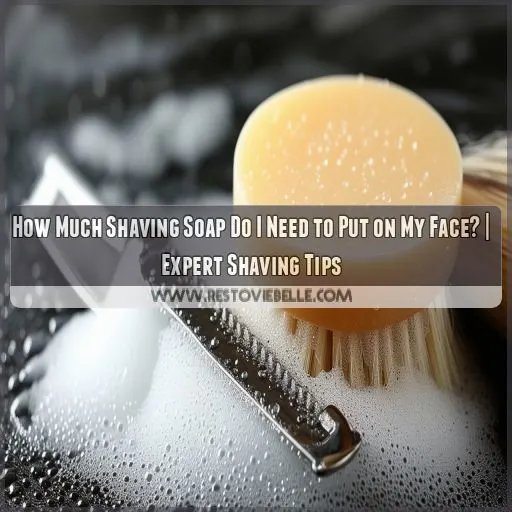
Knowing exactly how much to use maximizes this soap’s effectiveness and will have you experiencing a smoother, more comfortable shave.
Dive into our expert tips on using your shaving soap properly for the best results every time
Table Of Contents
- Key Takeaways
- How Much Shaving Soap Do I Need to Put on Face When Shaving?
- Shaving Soap Usage Per Shave
- Shaving Soap Longevity
- Lathering Shaving Soap With a Brush
- Cleaning Shaving Soap and Brush
- Benefits of Shaving Soap
- Traditional Wet Shaving
- Frequently Asked Questions (FAQs)
- How to properly use shaving soap?
- Is it OK to shave face with soap?
- How to face lather shaving soap?
- How many shaves can you get from shaving soap?
- Can You shave your face with regular soap?
- How do you use shaving soap?
- How do you shave with glycerin soap?
- How do you shave a smooth face?
- Can shaving soap expire or go bad?
- How does water hardness affect shaving soap performance?
- Is shaving soap suitable for sensitive skin?
- Can shaving soap be used on other body parts?
- Are there vegan alternatives to tallow-based shaving soaps?
- Conclusion
Key Takeaways
- Typically, you’ll use about 1-2 grams of shaving soap per shave – that’s not much, but a little goes a long way! Think of it like seasoning a steak – you don’t need to drown it, just enough to make it sing.
- Your brush type can affect how much soap you use. Synthetic brushes are like fuel-efficient cars, while badger or boar bristles are more like gas-guzzling SUVs – they might need up to 4 grams per shave.
- Lather up like a pro barista makes a cappuccino – start with a small amount of soap, then gradually add water until you’ve got that perfect, fluffy consistency. It’s an art form, really!
- Don’t be stingy with your soap, but don’t go overboard either. Finding your Goldilocks zone might take some trial and error, but once you nail it, you’ll be gliding through your shaves smoother than a hot knife through butter
How Much Shaving Soap Do I Need to Put on Face When Shaving?
You’ll typically need about 1-2 grams of shaving soap to put on your face when shaving. This amount can vary based on your brush type and shaving technique.
If you’re using a synthetic brush, aim for around 2 grams. For badger, boar, or horsehair brushes, you might use up to 4 grams. Single-pass shavers can get away with just 1 gram.
Factors like moisture content, lather hydration, and soap type also affect how much you’ll need. The key is to create a rich, creamy lather that provides ample protection and glide.
Mastering the art of lathering can elevate your shaving experience to new heights
Shaving Soap Usage Per Shave
Typically, you’ll use about 1-2 grams of shaving soap per shave, depending on your brush type and personal preferences. Factors like soap moisture content and lather hydration can affect this amount
Typical Usage
Generally speaking, you’ll use 1-2 grams of shaving soap per shave, although this might vary marginally depending on your type of brush and style of shave. Here’s how it breaks down:
- Synthetic Brush: Assuming usage of 2 grams per shave.
- Badger, Boar, or Horsehair Brushes: As much as roughly 4 grams can be used.
- Single pass shavers: 1 gram would suffice if you’re a single-pass type of person.
Efficient soap usage guarantees a rich lather without any kind of waste aimed at the economy on soaps and their duration.
Factors Affecting Usage
Factors affecting your shaving soap usage per shave range widely. The moisture content of the soap, hydration of the lather, and type of soap all play roles. Loading less soap and adding water can optimize your traditional shave. Brushes also matter—harder bristles can change the dynamics. Here are key factors:
- Moisture content of soap
- Soap’s water retention capacity
- Type of brush used
- Amount of soap loaded
- Hydration level during lathering
Shaving Soap Longevity
Shaving soap longevity depends on how much soap you use per shave and your personal habits. Typically, you’ll use 1-2 grams of soap per shave, but factors like moisture content and brush type can influence this
Estimates
Quality does have a say when it comes to the lifespan of shaving soap. Tallow-based and glycerin-based soaps tend to last longer, with some users even reporting that they’d used their single puck daily for more than one year. However, the use of soaps is relative from user to user and may be influenced by:
-Lather hydration and consistency
-Brush Type and Loading
- Personal shaving habits and preferences
Ultimately, the right shaving soap and lather creation paired with mindful usage can maximize value and enjoyment of your traditional wet shaving routine.
Habits Affecting Longevity
How long your shaving soap lasts really depends on your habits. Variables at play are:
- Soap variety: Various brands and types have different usage rates.
• Water temperature: Hot water may soften the soap more quickly, affecting longevity.
- Lather consistency: Too much water added wastes soap.
- Brush size: A larger brush may need to absorb more soap.
- Soap texture: Softer soaps are usually consumed faster.
Being mindful of these factors can stretch your soap’s lifespan significantly
Lathering Shaving Soap With a Brush
To create an ideal lather, start by wetting your shaving brush with warm water and optionally blooming the soap with hot water. Load the brush with soap in circular motions, then transfer the soap to a shaving bowl, working it until the lather becomes light and fluffy, adjusting the consistency with water or soap as needed
Steps
Start by choosing the right soap and brush. Load your brush by moving it in circles on the soap, creating bubbles. Watch for a rich lather forming
Wet Shaving Brush With Warm Water
Begin by wetting your shaving brush with warm water. The water temperature helps achieve the right soap consistency, enhancing the lather thickness based on your brush type
Bloom Soap With Hot Water (optional)
Consider blooming the soap with hot water, enhancing its consistency. Simply pour hot water over the soap, let it sit for a minute, then discard
Load Brush With Soap in Circular Motions
Work the brush in circular motions on the soap to load it well. This approach ensures that, for your shaving quality soaped up, you’ll have an optimal thickness of lather and clean brush bristles.
Gentle, constant pressure
- Ensure saturation of the brush
- Use quality soap
Lather Soap in Shaving Bowl Until Light and Fluffy
To achieve the right lather consistency, keep swirling the brush in your preferred bowl. Optimal soap loading and the correct brush bristle type ensure a light, fluffy lather
Add Water or Soap to Adjust Consistency
If your lather isn’t right, tweak the consistency. Add tiny drops of water to adjust viscosity or load more soap for better density and texture
Cleaning Shaving Soap and Brush
After using your shaving brush, be sure to rinse it thoroughly under water to remove any excess soap. When storing your shaving soap, leave the lid off to allow it to fully dry out between uses
Brush Cleaning
Cleaning your shaving brush is crucial. Different brush types need care to maintain brush quality. Regularly clean to preserve brush condition and ensure a stellar shave
Rinse Brush Under Water
Rinse your shaving brush under warm water. This helps remove leftover soap and maintains bristle health, ensuring your next lathering session achieves the perfect consistency
Squeeze Out Excess Soap
After rinsing your brush, you’ll want to gently squeeze out the excess soap. This ensures the brush dries properly, preventing soap softening and preserving the soap scent
Flick Brush to Remove Water
After using your shaving soap, flick the brush briskly to remove excess water. This keeps the brush clean and prepares it for its next use
Soap Storage
Soap storage is very essential in maintaining the texture of soaps. As a point of answering, follow these tips:
- Keep it in a cool dry place.
- Keep them in airtight containers.
- Don’t take direct sunlight.
- Good Ventilation
Leave Soap Lid Off to Dry
Leaving the lid of your soap off after use allows it to dry out, which will extend the life of the soap. Be sure to properly care for your brush, too, so it performs its best. Here’s a simple guide on storing your soap:
| Task | Tool Needed | Time Needed |
|---|---|---|
| Rinse brush | Water | 1 minute |
| Squeeze out excess | Hand | 30 seconds |
| Flick brush dry | Hand | 30 seconds |
Benefits of Shaving Soap
Shaving soap hydrates your skin, leaving it smooth and refreshed. It also enhances shaving protection by reducing the risk of nicks and irritation, making it a cost-effective solution for a quality shave
Skin Hydration Benefits
The proper way of cleaning the shaving soap and the brush is essential to enable you to enjoy the skin hydration advantages of shaving soaps.
Different brands of soaps cater to various skin types, providing deep moisture. It’s all about your choice of lather consistency and scent preferences that enhance your shaving experience, even when traveling, by keeping your skin optimally hydrated
Enhanced Shaving Protection
With high-quality ingredients that provide better care and protect your skin from razor nicks and razor burns, shaving soaps come with either tallow or glycerin to help enhance lubrication for a smooth shave.
Soaps of quality come with either tallow or glycerin, which helps improve lubrication for a smooth shave.
A thick lather made with a good brush reduces irritation to the skin and lets each pass be smooth and effective, refreshing the face
Cost-Effective Shaving Solution
Shaving soaps are an inexpensive way to shave. Good quality soaps may last months, saving many dollars in the long run.
If whipped to a lather correctly, they’ll produce a rich and consistent lather that will raise the quality of every shave.
They benefit the skin by providing moisturizing properties, thus minimizing cuts and irritation, to realize healthier skin with continued use
Traditional Wet Shaving
Traditional wet shaving isn’t just about technique; it’s an art that combines brush care, soap storage, and lather hydration.
- Brush Care: Using the right brush with proper bristle softness enhances your shaving experience.
- Soap Storage: Store your soap properly by keeping the lid off to avoid moisture buildup.
- Lather Hydration: Achieve the best lather by adjusting water for your preferred consistency.
Wet shaving is a cool, stylish, and enjoyable way to benefit your skin while mastering this timeless craft
Frequently Asked Questions (FAQs)
How to properly use shaving soap?
Wet your brush, swirl it on the soap to load it, then lather in a bowl or directly on your face. Build a rich, creamy lather by adding water gradually. Apply evenly, ensuring full coverage for a smooth shave
Is it OK to shave face with soap?
While you can shave with regular soap, it’s not ideal. Regular soap doesn’t provide the same lubrication and protection as shaving soap. You’re likely to experience more irritation, nicks, and a less comfortable shave overall
How to face lather shaving soap?
Like a sculptor crafting a masterpiece, wet your brush and face. Swirl the brush on soap, then on your face in circular motions. Add water gradually, building a rich lather. Continue until your face is fully covered
How many shaves can you get from shaving soap?
You’ll typically get 50-100 shaves from a puck of shaving soap, depending on its size and your usage. With proper technique, a 4 oz puck can last 3-4 months of daily shaving. Don’t overload your brush!
Can You shave your face with regular soap?
Ah, the brave souls tempted by bathroom economics! While you can use regular soap, it’s like using a butter knife for surgery. You’ll survive, but it won’t be pretty. Stick to shaving soap for a smoother, less irritating experience
How do you use shaving soap?
Wet your brush, load it with soap using circular motions, and lather in a bowl or on your face. Apply the rich lather evenly, ensuring full coverage. Reapply for multiple passes if needed. Rinse and enjoy your smooth shave!
How do you shave with glycerin soap?
Did you know 70% of wet shavers prefer glycerin soap? To use it, wet your face, rub the soap directly on your skin in circular motions, then shave. It’ll create a slick surface for a smooth, comfortable experience
How do you shave a smooth face?
To achieve a smooth face, start with a warm shower, apply pre-shave oil, and use quality shaving cream. Shave with the grain using short strokes, rinse often, and reapply lather for multiple passes. Finish with cold water and moisturizer
Can shaving soap expire or go bad?
Yes, shaving soap can expire. You’ll notice changes in scent, texture, or lather quality. While it won’t harm you, it’s best to use within 18 months. Store in a cool, dry place to extend shelf life
How does water hardness affect shaving soap performance?
You’d think soft water would make shaving a breeze, but hard water‘s your soap’s nemesis! It’ll diminish lather, reduce slickness, and leave residue. You’ll need more soap and elbow grease to achieve that perfect, smooth shave
Is shaving soap suitable for sensitive skin?
Shaving soap can be suitable for sensitive skin. You’ll want to choose a soap with natural ingredients and mild fragrances. Test a small area first, and consider fragrance-free options if you’re prone to irritation
Can shaving soap be used on other body parts?
You can use shaving soap on other body parts, but it’s primarily designed for facial hair. For legs, underarms, or chest, you’ll need more lather. Be gentle on sensitive areas and consider specialized products for coarse hair
Are there vegan alternatives to tallow-based shaving soaps?
Yes, there are vegan alternatives to tallow-based shaving soaps. You’ll find options made with plant-based oils like coconut, olive, and castor. These soaps can provide excellent lather and lubrication, rivaling their animal-derived counterparts in performance and skin care benefits
Conclusion
It’s all about precision in wet shaving, and learning how much shaving soap to apply to your face can make a real difference. This is typically very little, as a small amount travels a long way in providing both protection and hydration.
With proper lathering techniques and a little personal tweaking, you’ll hit that middle sweet spot. It’s all about experimentation and consistency.
You’ll find, with practice, what your ideal amount of shaving soap is. Use this old-school method and enjoy the benefits of a perfectly tailored shaving routine

